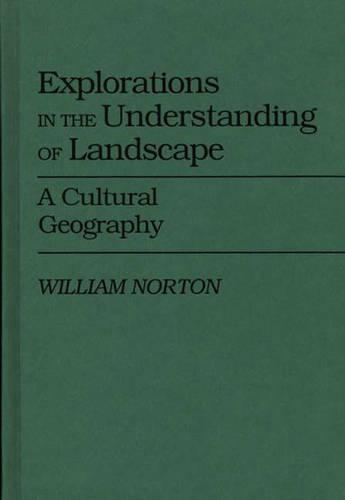
Explorations in the Understanding of Landscape: A Cultural Geography
(Hardback)
Publishing Details
Explorations in the Understanding of Landscape: A Cultural Geography
By (Author) William Norton
Bloomsbury Publishing PLC
Praeger Publishers Inc
3rd March 1989
United States
Classifications
Tertiary Education
Non Fiction
Applied ecology
304.2
Physical Properties
Hardback
213
Description
An innovative contribution to the literature of cultural geography, this book explores the evolution of landscape--both material and symbolic--from the standpoint of the populations, cultures, and human decision-making processes that shape and give it meaning. Focusing on evolution, behavior, symbolism, and ecology, Norton offers a critique of the literature of cultural and social geography and articulates a framework of central issues that connect a wide range of theoretical approaches. In the first four chapters, Norton gives detailed consideration to both traditional and contemporary literature and methodologies and to the links between cultural geography and other social science concepts and analytical methods. The remaining chapters are concerned with the causes and consequences of cultural landscape evolution and the variables affecting it, including language, religion, politics, society, economy, and the physical environment. In addressing these areas of cultural geography, Norton promotes an approach that integrates the contributions of geography with those of anthropology, sociology, psychology, and history. His analysis provides a useful synthesis of the conceptual and empirical content of cultural geography and suggests promising new directions for research in the field. Norton's work will prove a valuable classroom and library resource for students and scholars in cultural and social geography and related areas of sociology and anthropology.
Reviews
. . . Norton's assessment is an ambitious, almost audacious, and largely successful effort to bring together a tremendous amount of recent thinking and research in cultural and social geography and related disciplines. The book is an essential acquisition for geography librarians and human geographers and it would serve well as an integrative reading in advanced undergraduate or graduate cultural geography courses.-Special Libraries Association
Norton, author of Historical Analysis in Geography (1984), offers an evaluation of cultural geography and its central concept, landscape. The first part examines conceptual relationships between human culture and the environment and outlines methodological approaches both within and beyond the discipline that have contributed to the development of cultural geography. The author argues for the essential unity of cultural and social geography and discusses the contributions of anthropology and sociology. A second group of chapters assesses four approaches to the study of landscape: behavioral, evolutionary, symbolic, and ecological. Norton's book is a selective and personal evaluation of his field rather than a definitive history of its development or program for its future. The 23-page bibliography lists a selective group of 20th-century works in cultural geography. . . . Primarily for upper-division undergraduates and graduate students in geography.-Choice
." . . Norton's assessment is an ambitious, almost audacious, and largely successful effort to bring together a tremendous amount of recent thinking and research in cultural and social geography and related disciplines. The book is an essential acquisition for geography librarians and human geographers and it would serve well as an integrative reading in advanced undergraduate or graduate cultural geography courses."-Special Libraries Association
"Norton, author of Historical Analysis in Geography (1984), offers an evaluation of cultural geography and its central concept, landscape. The first part examines conceptual relationships between human culture and the environment and outlines methodological approaches both within and beyond the discipline that have contributed to the development of cultural geography. The author argues for the essential unity of cultural and social geography and discusses the contributions of anthropology and sociology. A second group of chapters assesses four approaches to the study of landscape: behavioral, evolutionary, symbolic, and ecological. Norton's book is a selective and personal evaluation of his field rather than a definitive history of its development or program for its future. The 23-page bibliography lists a selective group of 20th-century works in cultural geography. . . . Primarily for upper-division undergraduates and graduate students in geography."-Choice
Author Bio
WILLIAM NORTON is Professor of Geography and Department Head, the University of Manitoba. His publications include Historical Analysis in Geography, together with numerous articles and book chapters on topics in historical and cultural geography.
